17 Best Website Ideas For Beginners In 2024 (+ Examples)

Planning to launch a website this year? Here are the best website ideas for beginners.
Thousands of entrepreneurs are making significant incomes from their websites—and you could be one of them.
It’s easier than you think to get started. You don’t have to be a skilled web developer or have a ton of money to invest. Thanks to modern website builders, CMS solutions, and ecommerce platforms, anyone can build a professional website from scratch in less than an hour.
The hard part is coming up with an idea.
That’s why in this post, we’ll be sharing 17 of the best website ideas for beginners, alongside some real-life examples.
We’ve included a mixture of tried-and-tested website niches that are always profitable, as well as some more unique, underexplored ideas that you might not have considered. And we’ve also thrown in some tips to help you get started.
1. Niche blog
Blogs are content-driven websites on which you regularly publish useful and informative articles on topics related to your chosen niche (i.e. marketing, food, lifestyle, fitness, pet, fashion blog, etc.).
They’re one of the most straightforward types of websites you can create, and are super easy to manage, which makes them a great choice for beginners. And they can also be incredibly profitable if you get them right.
The idea is to regularly write and publish blog posts that are SEO-optimized around a keyword that your target audience searches for. You’ll be aiming to get these posts to rank on the first page of Google for a bunch of popular search terms, thus driving organic traffic to your website.
Then, you can monetize that website traffic to start earning money online from your blog. There are many monetization methods you can try, but one of the best is to sign up for an affiliate program and earn commissions by promoting those affiliate offers to your readers.
Professional bloggers earn 42% of their income through affiliate marketing like this, but you can also earn money through ad placements, sponsored posts, etc.
Example
You’re looking at an example of a niche blog website right now!
Blogging Wizard is a blog all about blogging (obviously), marketing, and building your online business.
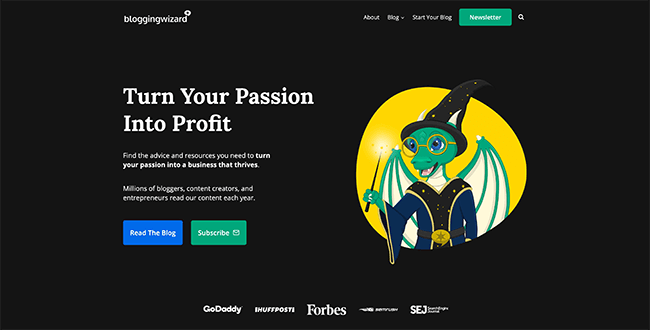
We get thousands of visits every month, and our readership mainly consists of beginner bloggers, SEOs, and entrepreneurs.
If you want to learn how to create your own personal blog website, you can start by reading our step-by-step tutorial.
And if you want to make your blog a success and learn how to generate a ton of traffic, you’ll want to check out our guide on how to promote your blog.
2. Ecommerce store
Ecommerce stores are websites through which you sell products. Global ecommerce sales were expected to reach almost $5 billion last year, so now’s the perfect time to create your own and claim your share of the pie.
You can sell any type of product you want through your ecommerce website: homeware, clothing, accessories… you name it.
Maybe you’ve got a photography website and want to sell your Art, or a music website production website who wants to start selling music beats, or project templates?
If you don’t want the hassle of managing inventory and shipping, you can just sell digital products like ebooks, templates, audio files, etc.
You can build your online store in minutes using an ecommerce platform like Sellfy. All you have to do is sign up, add your products, and customize the look and feel of your store. Then, connect a payment processor like Stripe or PayPal and you’re ready to start selling.
It comes with all the tools you need to manage your business including marketing features that can help you to drive sales. And it’s built specifically for creators, so it’s super easy to use even if you’re a complete beginner.
Example
Here’s an example of a successful Sellfy store selling digital downloads.
Headfonts sells downloadable font files and licenses to brands and designers. The great thing about this business model is that you never have to worry about running out of stock, and there are zero manufacturing costs.
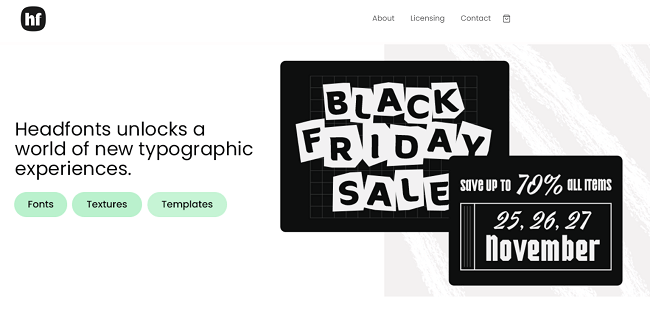
You only have to create the font once and you can sell it as many types as you like.
3. Print-on-demand site
Print-on-demand is a specific type of ecommerce store. Instead of selling regular inventory or digital files through your website, you’ll be selling custom merchandise printed with your own designs/artwork. Think printed tees, mugs, tote bags; that sort of thing.
But here’s the cool thing: Your supplier handles fulfillment for you and ships products directly to the customer, on-demand, as orders come in.
That means you don’t have to purchase or hold any stock up-front, so there’s very little initial investment required to get up and running. And it simplifies your operations. You don’t have to worry about fulfillment so you can focus on driving sales.
To set up a print-on-demand website, you’d usually need to build your online storefront with an ecommerce platform and then integrate it with a print-on-demand fulfillment provider like Printify.
But there’s a much easier way—you can just sign up for Sellfy.
Sellfy is the only ecommerce platform we’ve seen that offers native print-on-demand fulfillment services. So you can just sign up, create a website, choose the products you want to sell from Sellfy’s catalog, upload your designs to them, then import them into your product catalog and start selling.
When you make a sale, Sellfy will fulfill the order for you and then bill you for the base costs of the product and fulfillment later. You set your own retail prices so you’re in control of the profit margins.
Example
Classic Dad is an example of a print-on-demand store that’s really nailed down its chosen niche.
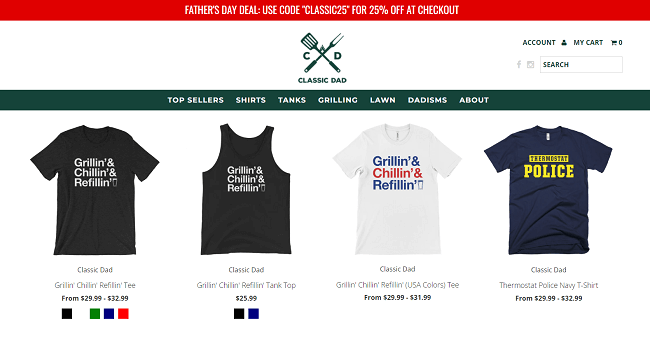
They’ve carved out their own space in the market by selling custom tees printed with hilariously accurate ‘Dadisms’. They know exactly who their target buyers are and have created effortlessly simple products that are sure to appeal to them.
4. Dropshipping store
Dropshipping stores are online stores that use a similar fulfillment method to print-on-demand. In both cases, you sell products at retail price, then forward the order to a supplier and pay them the wholesale price, and let them ship the order to the customer for you.
But with dropshipping, instead of selling merchandise printed with your designs, you’ll be selling regular products.
The advantage of starting a dropshipping store is that it’s a low-cost business venture that costs very little to start as you don’t need to hold stock. The disadvantage is that profit margins tend to be lower than in regular ecommerce stores.
You can use one of these dropshipping providers to start your own dropshipping website and find products/suppliers. We’d recommend Spocket.
Example
Meowingtons is an example of a successful dropshipping store targeting the pet (specifically, cat) market.
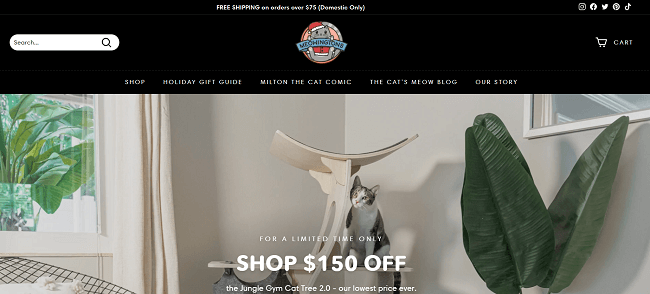
It sells a mix of print-on-demand merch and dropshipped products like cat toys and perch trees. They’ve really nailed their website design—the branding is on-point. And they’ve even got their own website blog, which no doubt helps drive organic traffic to their store so they can make more sales.
5. Multi-vendor marketplace
Instead of selling your own products, you could create your own online marketplace and let other retailers sell products through your website instead, then take a cut of the profits.
That’s exactly what websites like Amazon and Etsy do, and just look at how successful they are.
The Amazon marketplace is the biggest ecommerce site in the world and generates over $400 billion in annual sales.
To start your own marketplace, you’ll need to use a multi-vendor ecommerce platform like Shuup or CS-Cart. Alternatively, you can use a regular ecommerce platform and integrate it with a multi-vendor management plugin.
For example, you could build your store on BigCommerce and then use the Webkul app to turn it into a multi-vendor marketplace.
Example
Yumbles is a multi-vendor marketplace built on CS-Cart. It connects indie food and drink makers in the UK to customers.
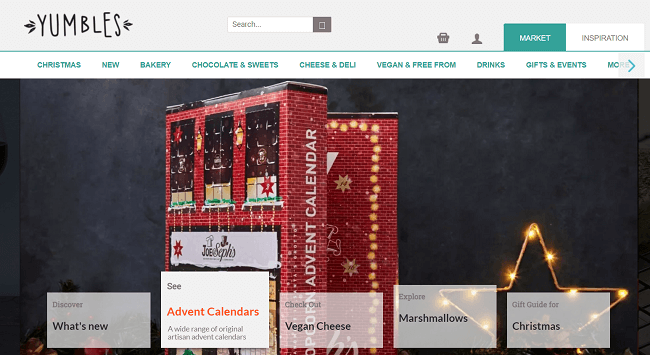
It’s been super successful and to date, has over 1,200 merchants and 7,000 products.
6. Online course website
Are you an expert in a certain topic? Got any skills that others might want to learn? If so, why not start your own eLearning website and start selling online courses?
Creating an online course website is easy thanks to platforms like Thinkific.
You can use these online course platforms to create your website and landing pages, build your course curriculum (add lessons, modules, etc.), manage your learners, and sell access through one-off payments or subscription memberships.
There are many different types of online courses you can sell.
For example, you might want to sell drip courses, in which content is delivered to your subscribers at set intervals (as opposed to giving them complete access to everything straight away).
Or you might want to offer cohort-based courses, in which all your students learn at the same time. In that case, it’s worth choosing a platform that lets you set up your own community space for students to interact with their peers and share knowledge.
The best online course platforms let you add all sorts of multimedia content to your lessons. You might create text-only courses or create video courses. And you might want to upload downloadable learning resources like templates, worksheets, and PDF instructions to your lessons.
Example
VR Dev School is a cool example of an online course website built through the Teachable platform.

The website offers courses that teach people how to create virtual reality games and online experiences for emerging technologies like the Oculus Rift and Google Cardboard.
7. Membership website
Membership websites are sites where people can pay for subscriptions to access exclusive, members-only content.
For example, your membership website might include a members-only forum space where your subscribers can interact.
And you can bundle that up with other perks, like exclusive content, livestream access, etc.
To build your membership website, you can use a subscription ecommerce platform like Podia. Or alternatively, you can build your site on WordPress and then install a WordPress membership plugin.
Example
Mythical Society is a membership website created by popular YouTubers Rhett & Link (from the channel Good Mythical Morning)

Fans of the show can join Mythical Society to access exclusive video content and behind-the-scenes footage, as well as unique merchandise and other perks.
It’s been a huge success for the YouTubers and provided them with a lucrative new way to monetize their audience outside of the YouTube platform.
8. Job board
Online job boards are websites that connect employers to job seekers.
They’re fairly straightforward to build: You just need a way to let employers post job listings and a page to list them on.
And they’re also easy to monetize. You can earn money through referral fees or by charging users for preferential job ad placement. For example, you could let users post job ads for free to get some traction but charge people to place those ads at the top of the page for maximum visibility.
Example
Problogger is a great example of a successful online job board. Take a look at the job listings page of their website:
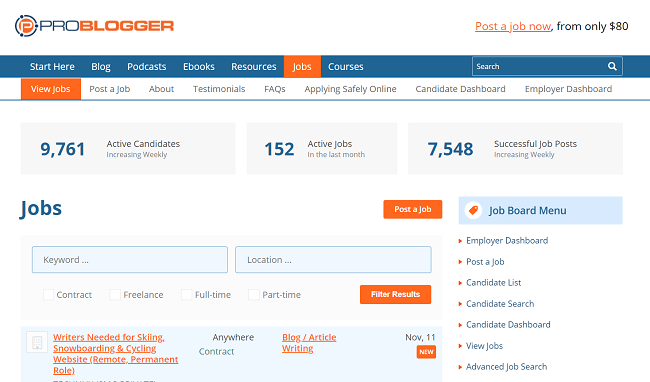
As you can see, there are dozens of job listings posted every month. And given that the website charges a decent amount for companies to post a job ad, it’s safe to assume they’re making thousands of dollars in monthly revenue for little effort.
Part of the reason for Problogger’s success is that they targeted a very specific niche: Freelance writers. This was an undersaturated market so they were quickly able to become one of the leading job boards in the space.
9. Review website
Review websites are similar to blogs. But instead of posting how-to content, listicles, and other blog posts, review websites exclusively focus on posting product review articles.
The most successful review websites target a specific niche. For example, you could write reviews of headphones, gaming chairs, mattresses… pretty much anything goes.
Review websites can be super lucrative, for two reasons:
First off, product reviews are always in-demand. Hundreds of new products are released every day, and there are always going to be people searching for reviews of those products—so review websites have plenty of longevity.
And secondly, they’re very easy to monetize. When you review a product, you can add an affiliate link that readers can click to buy the product (or if it gets a bad review, suggest a better product that you’re an affiliate for). Then if your readers click through and make a purchase, you’ll earn a commission on the sale.
Example
TechRadar is one of the most well-known—and successful—review websites out there. It focuses exclusively on tech products like computing, home entertainment, gadgets, etc.

TechRadar has been so successful that it reaches over 70 million readers and has become the most authoritative website in the space, with a domain authority score of over 90 (according to Moz). And as a result, it dominates the search results for tech product reviews.
10. News website
The most successful online news websites get an insane amount of website traffic, so why not start your own?
You can start small by focusing on a specific news niche. For example, you could publish the latest Astronomy news or news about your favorite football club. Then once you start growing your readership, you could consider expanding.
There are plenty of ways to monetize your news website. One of the easiest ways is to partner with an ad network and earn money based on ad views and clicks.
Example
Search Engine Land is a good example of a small news website that’s incredibly successful.

It’s focused on the SEO and marketing niche and provides marketers with the latest search news. For example, it regularly publishes articles notifying SEOs about algorithm updates.
11. Browser-based online game
Here’s another great website idea. If you have some programming skills, you could create your own browser-based online game and monetize it.
It doesn’t have to be anything super advanced. There are some really basic websites out there featuring super-simple games that get millions of visitors and make thousands of dollars every week by monetizing their users.
Example
There are a lot of examples we can look at here, but Geoguessr is one of the best.
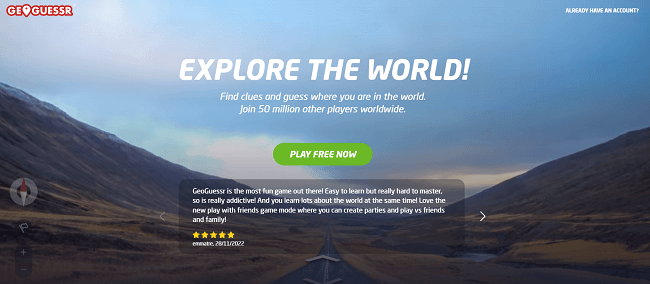
The idea behind the game is super simple. The website randomly selects a point on Google Maps and ‘drops’ you there. You then have to figure out where in the world you’ve been dropped as quickly as you can, and score points for speed and accuracy.
It’s not exactly very advanced. At its core, it’s just a simple script that selects a random point on Google Maps. So it didn’t take a huge developer team months to create it. In fact, it was created by one man: Anton Wallén in 2013—and it went instantly viral.
It’s been played by some of the biggest gaming YouTubers and streamers and is one of the most successful browser-based games of the last decade.
12. Online tool
This is another one that requires a certain degree of programming knowledge, but it can be super lucrative if you get it right.
If you can build an online tool that people use, you can generate tons of traffic and earn yourself a nice passive income.
For example, it could be something as simple as a tax calculator or ROI calculator. It could be a tool that automatically capitalizes words. Or even a basic image editor that automatically removes an image background.
The possibilities are endless.
Example
Soovle is an online tool designed to help marketers with keyword research. We included it in our roundup of the best keyword research tools.
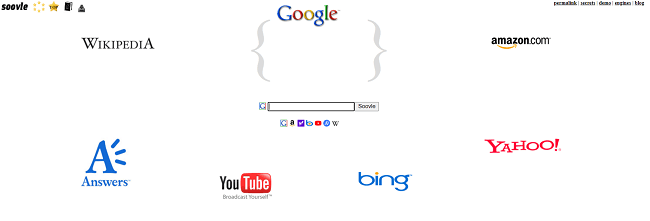
It’s a simple, fun, and free tool that automatically pulls search suggestions from search engines like Google, Bing, and YouTube.
13. Social network
What do Mark Zuckerberg, Jack Dorsey, and Zhang Yiming all have in common? They all created social media websites and are now billionaires as a result.
Social networks command a good chunk of internet traffic. Over half the global population is on social media and, on average, users spend over 2 hours a day on their favorite social networks.
If you can start your own social media website that’s even a tiny fraction as successful as Facebook, Twitter, Instagram, etc., you can quickly become a multi-millionaire.
But obviously, starting a successful social network is no easy feat. It’s a lot more difficult than starting a blog or ecommerce store. You’ll need a great idea, some programming skills to bring it to life, and a solid marketing strategy to attract users.
Example
Untappd is a cool example of a new, niche social network that caters to a smaller audience.
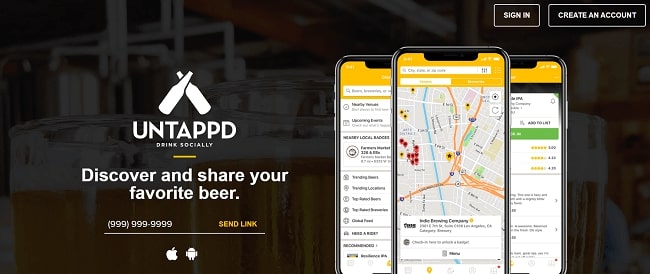
The idea behind it is to ‘make drinking social’. Users can create a profile and share what they’re drinking and where they’re drinking with their friends, earning badges along the way as they explore new brews and locations.
14. Novelty website
Novelty websites are a category all on their own. Basically, these are weird and wonderful websites that do something unique.
On account of their weirdness, they tend to generate a ton of publicity and have lots of viral potential. This can help drive lots of website traffic, which you can then monetize through ads and other strategies.
It’s easier to illustrate exactly what we mean by ‘novelty website’ with an example, so let’s look at a few.
Example
Pointer Pointer is a great example of a weird novelty website. Try clicking it and moving your cursor around the screen to see what happens.

Wherever you place your cursor, the website generates a random image of someone pointing directly at it. It’s mind-blowing and a little disconcerting, which is why it’s gone viral more than once.
Eel Slap is an even weirder humor website that’s managed to generate hundreds of thousands of likes on social media and millions of website visits.
The premise is gloriously simple. You just move your cursor across the screen to ‘slap’ someone with an eel.
15. Recipe website
Are you a talented chef? If so, why not create your own portfolio website and share your culinary creations with the world?
There are lots of food websites that share recipes out there, but there’s still room for more.
To stand the best chance of cutting through the noise and getting traffic, focus on a specific niche, conduct careful keyword research to see what recipes people are searching for, and start there.
Once you start getting traffic, you can monetize it by releasing your own digital cookbook and promoting it to your audience.
Example
Pinch of Yum is a great example of a cooking/recipe website done right.

It was created by former teacher-turned-website-owner Lindsay and gets thousands of visitors every month.
16. Language learning website
If you’re a talented polyglot, why not share your language learning tips and strategies with other learners through your website?
You could use an online course builder to create a full-fledged language tuition course, or just regularly publish blog posts with tips and tricks.
To monetize your traffic, you could sell courses or learning resources like language flashcards and memorization tools.
Example
Tofugu is a language-learning website targeted at people who want to learn Japanese.
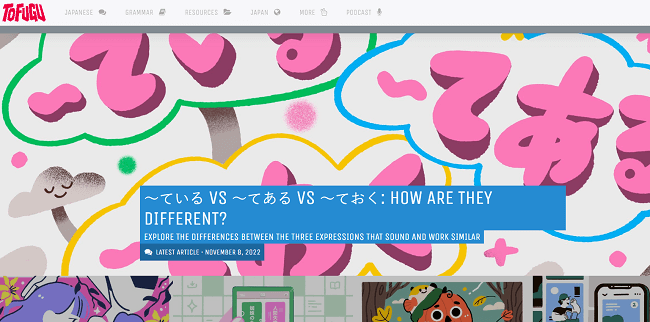
They regularly publish posts about Japanese topics to help people who want to live in Japan or just speak the language. Those posts include everything from news stories to in-depth grammar guides, textbook reviews, interviews, and more.
17. Quiz site
Everybody loves a quiz.
You can use a quiz maker like Interact to build your own personality quizzes, trivia quizzes, and other types of interactive content and then host them on your website.
The cool thing about this is that quizzes have a lot of viral potential—they practically market themselves. All you have to do is give users the option to share the results with their friends to drive a ton of referral traffic.
And you can monetize them by asking users to opt-in to your mailing list to get their results. Then you can monetize your mailing list through affiliate promotions, solo ads, etc.
However, in the case of this website ideas, I wouldn’t recommend making your website just about quizzes. Quizzes work best when combined with other content types. They’d make a great addition to any blog, for example.
Example
Harry Potter fan site Wizarding World has several online quizzes that are super popular.

Users can take part in the quizzes to discover their Hogwarts House, test their knowledge of the franchise, and more.
Final thoughts
That concludes our roundup of the best website ideas for beginners in 2022.
Still not sure what type of business website to build? Here’s what we’d suggest:
- Start with a blog if you’re a complete beginner. It’s the most straightforward type of website you can create, which makes it a good choice while you’re still learning the ropes. Plus, if you can generate enough traffic and monetize it effectively, blogs can be very lucrative.
- Create an ecommerce store if you already have a product idea. You can build your storefront in minutes using a platform like Sellfy and sell digital products, physical inventory, or print-on-demand merch.
- Make an online course website if you have knowledge that’s in demand and you want an easy way to earn a recurring revenue stream. You can set up your course website with Thinkific and sell access to your course content for one-off fees or subscription payments.
Disclosure: Our content is reader-supported. If you click on certain links we may make a commission.
